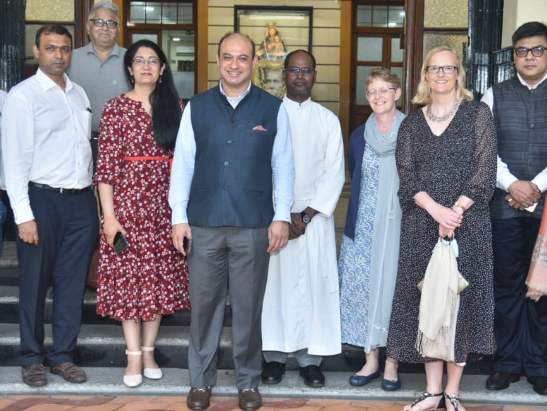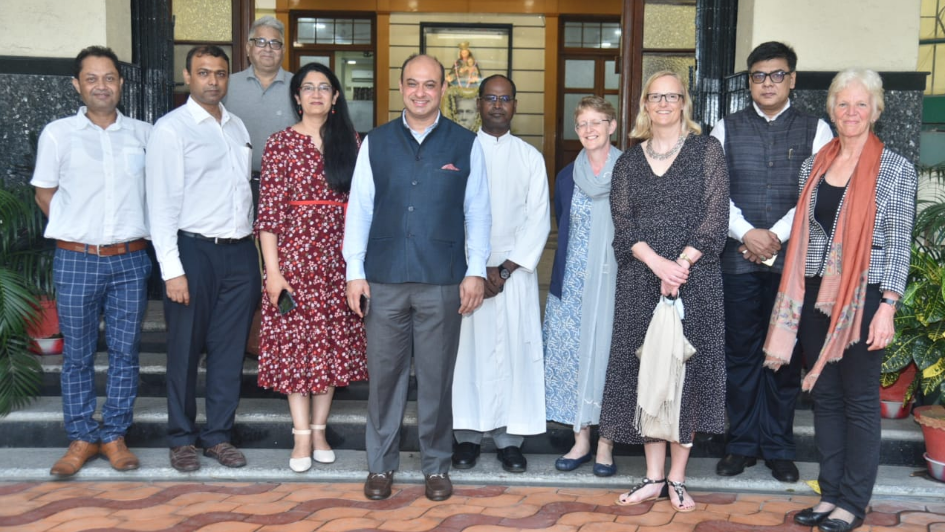
Image: ICR researchers, including group leader Dr Navita Somaiah, and their collaborators at the launch of the collaborative clinical trial and student exchange event in India. Credit: ICR.
Despite the many challenges caused by Covid-19 in the last two years, the ICR has continued to make efforts to drive forward its research worldwide and make exciting progress in cancer research including the launch of new international collaborations.
The Centre for Global Oncology – one year after launch
Last year we launched The Centre for Global Oncology, a research centre, that aims to improve connections with the global research community by bringing together ICR scientists with colleagues from international research centres, particularly from lower- and middle-income countries.
We are hoping that international collaborations will continue to develop innovative approaches to global cancer research, reduce inequality and improve access to treatments worldwide.
Currently, international collaborations are strengthening further in India, alongside programmes happening in Nepal and other lower and middle-income countries which are still in their early phases of development. Additionally, the centre is aiming to facilitate collaborations with high-income countries to improve the global understanding of cancer and drive cross-collaborations between different institutions.
Dr Anguraj Sadanandam, Director of the Centre for Global Oncology and leader of the Systems and Precision Cancer Medicine team at the ICR, said:
‘‘The ICR is helping scientists in lower- and middle-income countries set their research infrastructure, co-publish scientific papers and, importantly, is providing funding where possible. This enables us to study the disparity of cancer at a global scale while giving patients in these countries more hope to access life-saving treatments. By the end of this year, we are planning to expand the team to include more clinicians from The Royal Marsden.’’
New study on the immune landscape of Indian breast cancer
One example of international collaboration is a study led by Dr Sadanandam and his research team, working with clinicians and researchers from St. John’s Research Institute and Shri Shankara Cancer Hospital and Research Centre in Bangalore, India. The study investigated and compared the immune landscape of Indian and Western triple negative breast cancers using artificial intelligence and machine learning and was recently published in Translational Oncology journal.
Triple negative breast cancer is a complex disease with high recurrence and mortality rates worldwide, yet little research has been done in lower- and middle-income countries, such as India where the incidence rate is double the UK’s. While current treatments in India are based on Western clinical guidelines, there is no evidence to use them in Indian patients. This motivated Dr Sadanandam’s team to conduct the first study of its kind in India.
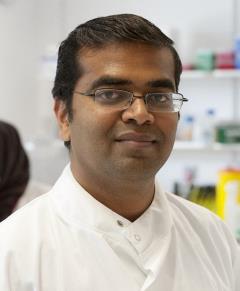 The study provides evidence that the immune gene expression in these two distinct populations are largely similar, suggesting that immunotherapy and immune-related treatments in the West may be adopted in India. However there may be differences at genetic (DNA-based) or genomic level which the researchers are currently investigating and may need to be considered further for geography-specific personalised therapy.
The study provides evidence that the immune gene expression in these two distinct populations are largely similar, suggesting that immunotherapy and immune-related treatments in the West may be adopted in India. However there may be differences at genetic (DNA-based) or genomic level which the researchers are currently investigating and may need to be considered further for geography-specific personalised therapy.
These findings could ultimately accelerate the use of these treatments for Indian patients. Dr Sadanandam added:
“Global oncology is currently a hot topic. The immune landscape of patients with breast cancer in lower- and middle-income countries in comparison to the Western world landscape hasn’t been elucidated yet. We’ve only recently started to untangle this puzzle and give some answers on how similar they are to guide appropriate treatment for those patients.
“The good news is that at least from an immunotherapy point of view triple negative patients in India can continue using their current treatments without concerns.”
ICR’s first collaborative clinical trial in India
Earlier this year, the ICR launched its first joint clinical radiotherapy trial in India – phase II of the KORTUC trial.
We recently spoke to Dr Navita Somaiah, Chief Investigator of the trial and Team Leader in the Division of Radiotherapy and Imaging at the ICR, after her visit to their counterparts in India for the official trial launch.
The trial, sponsored by the ICR, is testing hydrogen peroxide as a readily available and cost-effective radiation sensitiser in locally advanced breast cancers which, if successful, could be a game-changer not only for breast cancer patients but also for patients with other types of cancer.
Dr Somaiah shared with us that the trial is based in six centres across the UK and is currently being launched in multiple centres throughout India. Two Indian patients have already been recruited at Tata Medical Centre in Kolkata, and study investigators are planning two more years of recruitment followed by two years follow-up in the study. Dr Somaiah said:
“It’s a fantastic first step for the ICR taking a sponsorship role and the responsibility of conducting a clinical trial millions of miles away in a low-to-middle-income country with a completely different governance structure and clinical trial regulations. It took years of hard work, but I am very proud of getting the approval to get it going.
“I am hopeful that it sets a precedent for other trials to follow suit as we have the expertise on how to navigate the requirements for future global trials, beyond Europe. Also, as part of this trial, we are keen to share our expertise with other international research centres especially in terms of sophisticated imaging protocols to help them improve their research capabilities.”
Student exchange programme in India
Dr Somaiah also launched a student exchange programme during her visit, aiming to inspire Indian A-level students to take up medicine and scientific research by sponsoring two students to spend up to two weeks at the ICR and The Royal Marsden.
She shared with us how they came up with the idea and current plans with this:
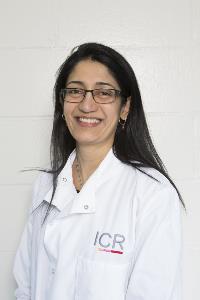
“In India it is common for young people to have the desire to become doctors but this combined with a career in science is pretty much non-existent. I told our trial partner in India, Dr Sanjoy Chatterjee, about the outreach programme that we have here with GCSE/A-level students coming to the clinic and he suggested that we could do a similar one with Indian students. Things have moved very fast since then.
“The head of the Alumni association at St. Xavier’s College, Kolkata, recently came to the UK to work out the programme logistics. The selected students will have the opportunity to liaise with team leaders at the ICR, get work experience in the lab and exposure to various clinical and research aspects. We are planning to host students from next summer and hopefully this will continue in the following years.”
UK fellowships with Nepalese oncologists
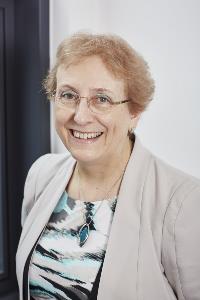 The ICR has led similar exchange programmes for several years. Professor Ros Eeles, leader of the Oncogenetics Team at the ICR and Clinical Oncology and Oncogenetics Consultant at The Royal Marsden NHS Foundation Trust, has been leading a British/Nepalese exchange programme since 2017. The programme has improved the provision of oncology services in Nepal.
The ICR has led similar exchange programmes for several years. Professor Ros Eeles, leader of the Oncogenetics Team at the ICR and Clinical Oncology and Oncogenetics Consultant at The Royal Marsden NHS Foundation Trust, has been leading a British/Nepalese exchange programme since 2017. The programme has improved the provision of oncology services in Nepal.
Professor Eeles, who has co-ordinated various international studies and is recognised for her leading contribution to the field of prostate cancer research, leads the scheme, which involves oncologists from Nepal being invited to participate in a three-month fellowship at the ICR and The Royal Marsden.
Four Nepalese oncologists have taken part in the scheme so far – two radiation oncologists and two medical oncologists. The funding for this scheme has now finished but Professor Eeles and her team continue to do research collaborations with Nepalese specialists from the Gri hospital in Kathmandu, including Professor Bishnudutta Paudel who has been involved in supporting the scheme and is keen to increase the amount of training:
“Due to the support and close collaboration between Professor Ros, myself and the oncology faculties, oncology trainees from Nepal could visit The Royal Marsden and the ICR to learn new skills and knowledge related to clinical and research activities. I believe that if this could be continued the standard of cancer care will be improved in Nepal.”
Andy Sparkes, the former UK Ambassador to Nepal who now chairs the Britain Nepal Society, said:
"I might have known that when I invited my dear friend Professor Ros Eeles to Nepal during my time there, that she would generate something of lasting good from the visit. That's the way she is! And so it proved. I am delighted that through her energy and vision, plus the generosity of the ICR and The Royal Marsden in providing world-class oncology training pro bono, and the efficiency and dedication of the Britain Nepal Medical Trust, the training fellowships scheme got off the ground.
“Through the graduation of four outstanding initial fellows from Nepal to act as multipliers, I am sure that oncology in Nepal has already taken significant steps forward and hope that funding for travel and living expenses will materialise for future fellows to partake in the programme.
“In the special relationship which Britain has long had with Nepal, there have been many instances of British medical professionals offering their expertise after being captivated by the beauty of Nepal and the dignity and courage of her people. This initiative stands squarely in that tradition and all involved can be justly proud."
Professor Eeles spoke about the impact these fellowships have had and her hopes to do more:
“Cancer is a global issue. By working with international colleagues, we can all learn from each other to improve care for cancer patients. Our training fellowships with Nepalese oncologists involved a two-way process of learning: they came to us to learn more about research methodology, while we learned more about the Nepalese cancer landscape and the challenges, they are facing in terms of patient care.
“We couldn’t have done these fantastic fellowships without the Britain Nepal Medical Trust (BNMT), a non-governmental organisation with centres both in the UK and Nepal, through which the grant has been disbursed. We are hoping to get funding for more training fellowships in Nepal in the future, therefore we’re looking into applying for grants and seeking support for this.”
Cancer is a global problem that doesn’t respect borders – taking lives everywhere around the world. But sadly, the survival chances for patients diagnosed with cancer in some countries are much worse than they are in others. It is crucial to increase collaborative research to develop better diagnostic tools and treatments which could be life-saving and suitable for use in different clinical settings across the globe.
We, at the ICR, are keen to expand our collaborations in multiple countries in different continents to improve our understanding of global cancer and facilitate access to innovative treatments for those who need them the most. Ultimately, this could help reduce inequalities in cancer treatment, in groups who have been historically under-represented in research.
